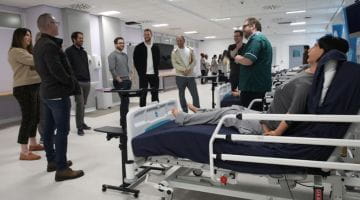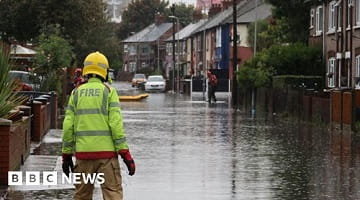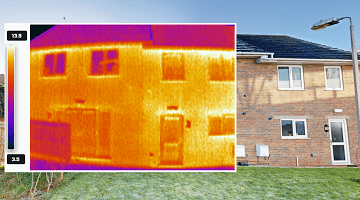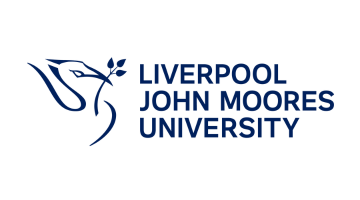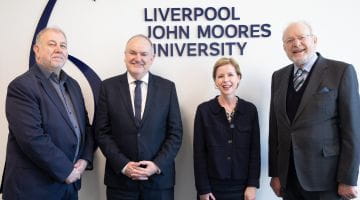Why study this course with LJMU?
- Part of the MEng Civil Engineering suite of programmes, which achieved 94% overall student satisfaction rates in 2014
- Excellent links with industry plus the opportunity to undertake a year's paid placement
- £6 million recently invested in state-of-the-art teaching facilities
- Excellent career prospects both in the UK and overseas
- LJMU ranked 16th in the UK for construction, surveying and planning courses (The Guardian University Guide 2025)
-
LJMU ranked 15th university in the UK for general engineering degrees (The Times UK University Rankings 2025)
-
LJMU ranked 8th university in the UK for building degrees (The Times UK University Rankings 2025)
About your course
Completing the MEng (Hons) Civil and Structural Engineering at Liverpool John Moores University will enable you to graduate with a Masters-level qualification plus the specialist knowledge and experience required to succeed in the world of civil engineering.
Additional course costs
There are no costs for day site visits for core and optional modules. Optional field trips and site visits will have costs involved. Students will need to purchase safety boots for site visits, and a basic scientific calculator.
Civil and structural engineers design, plan and manage civil and environmental projects from concept to realisation, considering structural problems and aesthetics as well as the environmental and economic impacts.
To succeed in this exciting profession, you will need to be competent technically, practical in outlook and capable of giving professional advice on a variety of subjects ranging from design to construction and site management.
The MEng in Civil and Structural Engineering gives you plenty of opportunities to apply your studies to real world situations, supported by employers from industry who provide case studies and suggestions for projects and the year-long work placement should you take this option.
What is an integrated masters (MEng) programme?
The MEng in Civil and Structural Engineering is an integrated master's degree. This means that it combines undergraduate and postgraduate study into a single course.
What are the benefits of completing an MEng degree?
- You will graduate with a Masters level degree without having to apply for an MSc course
- You will gain a depth of specialist knowledge and experience highly sought after by employers
- You will be able to undertake the Initial Professional Development (on-the-job training) required to become a Chartered Engineer as soon as you graduate
- You will enjoy excellent career prospects and expect to command higher salaries than graduates with a BEng
What financial support is available to MEng students?
You will be eligible to apply for the same financial support as other undergraduates for the duration of your MEng. This includes student loans to cover your tuition fees and living expenses plus means-tested grants and bursaries. This financial support is not available to students who enrol on an MSc degree after completing a BEng programme. Furthermore, if you are awarded an LJMU scholarship worth 1,000 or 10,000 you will receive this award for every year of your degree as well.
Why study civil engineering at LJMU?
LJMUs civil engineering programmes are delivered by the School of Civil Engineering and Built Environment, one of the UKs leading research departments for built environment and sustainability research. LJMU is also ranked in the top 15 higher education institutions working in this field. This research directly informs all of LJMUs civil engineering programmes, so you can be confident that your studies will reflect ongoing developments and innovation in this exciting field.
The School's programmes are designed to develop innovative and creative professionals equipped to react to the challenges of the modern global built environment. Staff provide excellent levels of support to ensure you reach your full potential.
Furthermore, extensive links with professional bodies and industry mean you will enjoy a wide range of opportunities for work-placements, professional skills development and networking with potential employers. Thats why our students enjoy excellent career prospects after they graduate.
Course modules
What you will study on this degree
Further guidance on modules
Modules are designated core or optional in accordance with professional body requirements, as applicable, and LJMU’s Academic Framework Regulations. Whilst you are required to study core modules, optional modules provide you with an element of choice. Their availability may vary and will be subject to meeting minimum student numbers.
Where changes to modules are necessary these will be communicated as appropriate.
Core modules
Core modules
Optional modules
Core modules
Core modules
Professional accreditation
The accrediting body for this degree is the Joint Board of Moderators for the Institution of Civil Engineers, Institution of Structural Engineers, Institute of Highway Engineers, and the Chartered Institution of Highways and Transportation. Please see www.jbm.org.uk for further information.
This degree is accredited as fully satisfying the educational base for a Chartered Engineer (CEng).
See www.jbm.org.uk for further information.
Ultimately, with relevant work experience and a masters-level degree, the degree can lead to the professional qualification of Chartered Engineer (CEng) and the equivalent European Qualification of EurIng.
This programme is also accredited by IStructE.
Your Learning Experience
Excellent facilities and learning resources
We adopt an active blended learning approach, meaning you will experience a combination of face-to-face and online learning during your time at LJMU. This enables you to experience a rich and diverse learning experience and engage fully with your studies. Our approach ensures that you can easily access support from your personal tutor, either by meeting them on-campus or via a video call to suit your needs.
Teaching on the course is via a combination of lectures, laboratory work, tutorials, workshops and practical sessions, combined with your own research using our library and the web.
You can expect to spend around nine hours per week in lectures, four in tutorials and up to four in workshops, practical and field-based studies, plus around 32 hours per week in private study.
Work-based Learning
The best way to experience working in the civil engineering industry is to undertake a year's professional work placement, either in the UK or overseas, so you can put into practice what you have learnt in your first two years.
The placement is fully paid and is an invaluable opportunity to learn new skills and gain hands-on experience to add real value to your CV and impress future employers. The direct work experience could also count towards a professional qualification. Taking the sandwich option will greatly improve your career prospects and could even lead to a permanent position with your placement employer.
Dedicated personal tutor, plus study skills support
Throughout the course you will have the support of a personal tutor who can provide one-to-one guidance and advice on course-related issues.
If you decide to take up a third year work placement, there is plenty of support available from the Faculty's Industry Unit, both in finding and securing the placement, and during the year when one of your tutors will visit you in your workplace to check on your progress.
Assessment varies depending on the modules you choose, but will usually include a combination of exams and coursework.
We recognise that all students perform differently depending on the type of assessment they are asked to do, and so a variety of assessment methods are used. These include exams (open and closed book), coursework (projects, technical reports, reviews, etc), and presentations (individual and group).
Your tutors will give prompt and constructive feedback via Canvas (our virtual learning environment), face-to-face or in writing.
Where you will study
This programme is delivered in the Byrom Street complex of LJMUs City Campus. Here you'll find high quality lecture theatres, meeting and seminar rooms plus social spaces and a large café. The Avril Robarts Library is just minutes away on Tithebarn Street.


Lecturers on this exciting new degree come from a variety of backgrounds and most have experience working within the civil engineering industry.
Career paths
Graduates in civil and structural engineering are in high demand, with many securing job offers before they graduate.
While civil engineers may work on site, structural engineers usually work in office-based design engineering companies, government agencies or non-governmental organisations. You will enjoy excellent opportunities for work both in the UK and overseas, working on on projects, such as:
- tall buildings
- football stadia
- bridges
- roads
- water treatment works
The transferable skills developed on this course are also highly valued in many other fields of employment.
Student Futures - Careers, Employability and Enterprise Service
A wide range of opportunities and support is available to you, within and beyond your course, to ensure our students experience a transformation in their career trajectory. Every undergraduate curriculum includes Future Focus during Level 4, an e-learning resource and workshop designed to help you to develop your talents, passion and purpose.
Every student has access to Careers Zone 24/7, LJMU's suite of online Apps, resources and jobs board via the LJMU Student Futures website.
Tuition fees and funding
- Full-time per year:
- £9,535
- Placement year:
- £1,905
Fees
The fees quoted above cover registration, tuition, supervision, assessment and examinations as well as library membership and student IT support with access to printed, multimedia and digital resources including programme-appropriate software and on campus Wi-Fi.
Financial Support
The University offers a range of scholarships to support students through their studies. You'll find all the information you need on our specialist funding pages, including details of the Student Support Fund and other activities to support with the cost of living.
Additional Costs
In addition to fees, students should also keep in mind the cost of:
- Accommodation
- Travel costs including those for placements, visas and travel for studying abroad and field trips unless paid for by LJMU
- Stationery, IT equipment, professional body membership and graduation gown hire
The University reserves the right to increase tuition fees in accordance with any changes to the maximum allowable fees set by the UK Parliament. In the event of such a change, any fee increase will be subject to a maximum cap of 10% of the total course cost as originally stated at the time of your offer.
Entry requirements
Please choose your qualifications below to view requirements
Grades/points required from qualifications: ABB-AAB (128-136)
Work out how many UCAS points your qualifications are worth by visiting the UCAS Tariff Calculator.
Qualification requirements
How to apply
Securing your place at LJMU
UCAS is the official application route for our full-time undergraduate courses. Further information on the UCAS application process can be found here https://www.ljmu.ac.uk/study/undergraduate-students/how-to-apply.
Your university life
From accommodation and academic support to clubs and societies. Find out what LJMU has to offer.
Related Links
Talk to our students
Connect with a current LJMU student for advice and guidance on university life, courses and more.
See what our students are saying
At LJMU we want you to know you're making the right choice by studying with us. You can see what our students are saying about their experience with us through their reviews on the following websites:
Related Links
News and views
Browse through the latest news and stories from the university
The university reserves the right to withdraw or make alterations to a course and facilities if necessary; this may be because such changes are deemed to be beneficial to students, are minor in nature and unlikely to impact negatively upon students or become necessary due to circumstances beyond the control of the university. Where this does happen, the university operates a policy of consultation, advice and support to all enrolled students affected by the proposed change to their course or module.
Further information on the terms and conditions of any offer made, our admissions policy and the complaints and appeals process.



















